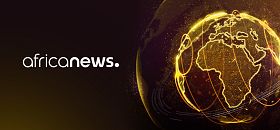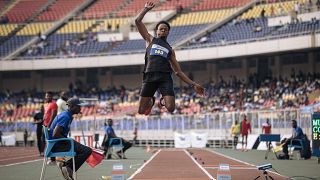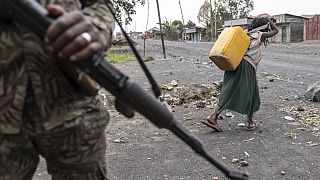Democratic Republic Of Congo
The Democratic Republic of Congo boosted its credit rating from 5.1 to 5.5 between 2022 and 2023, according to thepan-African rating agency Bloomfield. The sub-Saharan country has one of the highest growth rates in the region.
The DRC gained 40 basis points in the space of a year which is helping to boost the nation's economic profile.
The second edition of the Congolese Country Risk Conference took place in Kinshasa on 28 June; an event designed to attract more investment and make the DRC a lasting success.
"This is an endogenous exercise. The Democratic Republic of Congo wants it. It is an opportunity for dialogue between all the stakeholders, first and foremost the private sector" Nicolas Kazadi, the DRC's finance minister, told Euronews.
The DRC continues to face real challenges, including inadequate infrastructure, arbitrary taxes and insecurity in the east of the country.
Since 1996, six million people have died in eastern DRC, the epicentre of ethnic tensions in the country and the fight over vital natural resources.
A climate of instability is bad news for potential investors.
In recent years, the government has stepped up reforms and placed an emphasis on:
- macroeconomic performance
- responsible management of public finances
- stabilising the financial system
These three factors are necessary to cement the country's credibility, particularly in the eyes of private investors and to ensure that social issues, job creation and wealth creation are not relegated to a blind spot.
“Generally speaking, I would say that this is a very good thing and that these are very good initiatives. Because you can feel the government's desire to do the right thing” said Marie Chantal Kaninda, the Chief Executive Officer of Glencore in the DRC.
Transparency is key
While the DRC has vast mineral deposits it is looking to diversify its economy. For the banks to support these ambitions for diversification and growth, they must advocate an effective and clear policy, as Gancho Kipulu Baya, the Country Head of Rawbank explained: “The major challenge is one of transparency. The challenge of traceability for exported products.
"And we, the banks, are grafting ourselves onto this market, and we also need the support of the State, which must ensure this transparency and traceability to enable us to secure adequate financing".
Thanks to a Turkish-Congolese initiative, a new financial centre in Kinshasa will be inaugurated in December. It is part of this new value chain including five towers and a conference centre spanning 90,000 m2 which is all thanks to an investment of more than 300 million US dollars (€275 million).
It will have interconnected services that will concentrate several operations on a single site to optimise the services of the Ministry of the Budget and the Ministry of Finance. These public-private alliances are shaping the future financial and urban architecture of the Congolese capital.
"It's going to be like a financial hub. Also a governmental hub of the DRC, in the heart of the country. But also, we got a Kinshasa airport project. The Kinshasa airport project is going to be the hub of the central African region; with an eight million passengers capacity, and one of the largest cargo terminals on the African continent" said Turhan Mildon, the Chairman of the Board, at construction giant MIlvest.
"Besides that, I can mention the Arena Project; a sports facilities that we are building here. We are advancing Congolese workers here in the country. Also, we have an academy, that we established here, to educate the Congolese. So these investments will add value to the country, and will also add value to the business environment of the country as well".
But challenges remain. With more than 80 million hectares of fertile land and favourable conditions for year-round farming, the country's production is too low. Over 80% of consumer food products are imported.
But, Safia Ibrahim-Netter, the Director of the French Development Agency, DRC explained that optimising the agricultural policy will enable the DRC to re-establish itself as a giant on the international stage.
"We wouldn't have been able to do all this if there hadn't been an agreement with the IMF, and for there to be an agreement with the IMF, reforms had to be implemented. So that's how I see the DRC: not a day goes by without a French company expressing its desire to come here".











01:16
Africa mourns Pope Francis, a voice for peace and justice
01:14
ECOWAS Meets in Ghana to Tackle Member Withdrawals
Go to video
EU foreign ministers discuss Ukraine, Syria and EU-African relations in Luxembourg.
Go to video
U.N reports thousands of children raped in Eastern Congo
Go to video
Africa’s trade winds shift amid tariffs, reforms, and regional tensions {Business Africa}
01:58
Latin American leaders urge unity amid U.S. trade and migration tensions